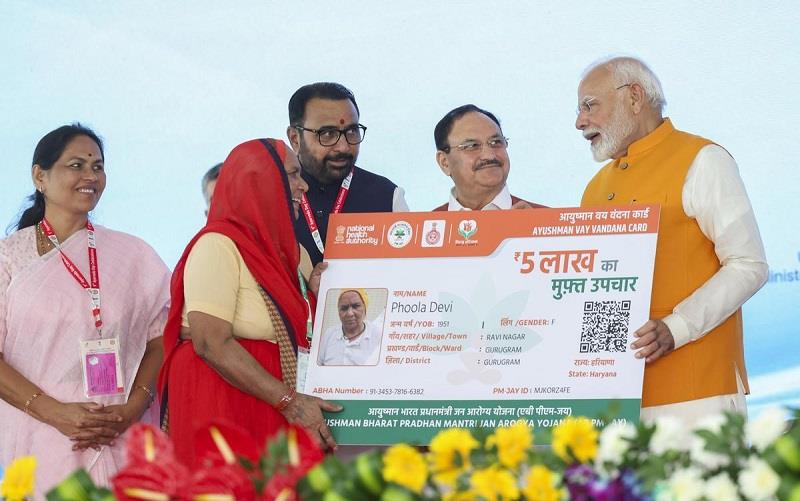(MENAFN- Kashmir Observer) New Delhi- Prime Minister Narendra Modi on Tuesday launched development projects worth nearly Rs 12,850 crore and extended his government's flagship health insurance scheme Ayushman Bharat to all senior citizens aged 70 years and above.
The major push in the health sector was unveiled on the occasion of the ninth Ayurveda Day and the birth anniversary of Dhanvantari, the Hindu god of medicine.
ADVERTISEMENT
According to the PIB's social media account on X,“Prime Minister @narendramodi launches the Ayushman Bharat Pradhan Mantri Jan Arogya Yojana (AB-PMJAY) to extend healthcare coverage to all citizens aged 70 years and above, regardless of socio-economic status. This ensures accessible and affordable care for all senior citizens. With coverage of up to ₹5 lakh annually for free treatment, the scheme sets new standards in healthcare accessibility and inclusivity for our elders.”
ADVERTISEMENT
What is the Ayushman Vaya Vandana Card?
“Now, every senior citizen above the age of 70 will receive free treatment in hospitals. These senior citizens will be issued the Ayushman Vaya Vandana Card. This scheme is expected to be a milestone. If an elderly person in the household has the Ayushman Vaya Vandana Card, family expenses will be reduced, and their worries will also diminish,” stated another PIB tweet.
Read Also
Govt Creating System That Gives Opportunity To Every Youngster: PM Modi
'80% Strokes Preventable Through Management Of Key Health Conditions'
“Expressing satisfaction on the expansion of Ayushman Yojana, Shri Modi said that every elderly person was looking forward to it and the poll guarantee, if elected for the third term, of bringing all the elderly above 70 years of age under the ambit of Ayushman Yojana was being fulfilled. He added that every elderly person above 70 years of age in the country will get free treatment in the hospital by a Ayushman Vaya Vandana Card. Shri Modi highlighted that the card was universal and there was
no restriction on income, be it poor or middle class or upper class. Informing that the scheme would prove to be a milestone for its universal applicability, Shri Modi remarked that with a Ayushman Vaya Vandana card for an elderly in the house, the Out-of-Pocket expenditure will be reduced to a great extent. He congratulated all the countrymen for this scheme and also informed that the scheme was not implemented in Delhi and West Bengal,” stated a PIB release issued on October 29.
Modi also inaugurated phase II of India's first All India Institute of Ayurveda in the national capital which includes a Panchakarma hospital, an Ayurvedic pharmacy for drug manufacturing, a sports medicine unit, a central library, an IT and startup incubation centre, and a 500-seat auditorium among others.
In an innovative usage of drone technology to enhance service delivery and make healthcare more accessible, Modi launched drone services at 11 tertiary healthcare institutions.
These are AIIMS-Rishikesh in Uttarakhand, AIIMS-Bibinagar in Telangana, AIIMS-Guwahati in Assam, AIIMS-Bhopal in Madhya Pradesh, AIIMS-Jodhpur in Rajasthan, AIIMS-Patna in Bihar, AIIMS-Bilaspur in Himachal Pradesh, AIIMS-Raebareli in Uttar Pradesh, AIIMS-Raipur in Chhattisgarh, AIIMS-Mangalagiri in Andhra Pradesh and RIMS-Imphal in Manipur.
The prime minister also launched a helicopter emergency medical service from AIIMS Rishikesh, which will help deliver medical care speedily.
Modi launched a U-WIN portal that seeks to benefit pregnant women and infants by fully digitising the vaccination process.
It will ensure timely administration of life-saving vaccines to pregnant women and children (from birth to 16 years) against 12 vaccine-preventable diseases.
Further, the prime minister launched a portal for allied and healthcare professionals and institutes. It will act as a centralised database of existing healthcare professionals and institutes.
Modi also inaugurated three medical colleges at Mandsaur, Neemuch and Seoni in Madhya Pradesh, besides facility and service extensions at various AIIMS - Bilaspur in Himachal Pradesh, Kalyani in West Bengal, Patna in Bihar, Gorakhpur in Uttar Pradesh, Bhopal in Madhya Pradesh, Guwahati in Assam and in New Delhi, which also include a Jan Aushadhi Kendra.
Modi also inaugurated a Super Speciality Block in Government Medical College at Bilaspur in Chhattisgarh and a Critical Care Block in Bargarh, Odisha.
The prime minister laid the foundation stones of five nursing colleges in Shivpuri, Ratlam, Khandwa, Rajgarh and Mandsaur in Madhya Pradesh, 21 critical care blocks at Himachal Pradesh, Karnataka, Manipur, Tamil Nadu and Rajasthan under the Ayushman Bharat Health Infrastructure Mission, and several facilities and service extensions at AIIMS in New Delhi and Himachal Pradesh's Bilaspur.
Among other projects, Modi inaugurated an ESIC hospital at Indore in Madhya Pradesh and laid the foundation stone for such hospitals at Faridabad in Haryana, Bommasandra and Narasapur in Karnataka, Indore in Madhya Pradesh, Meerut in Uttar Pradesh, and Atchutapuram in Andhra Pradesh.
These projects are expected to bring healthcare benefits to around 55 lakh ESI beneficiaries.
The other projects whose foundation stones were laid include a central research institute in yoga and naturopathy at Khordha in Odisha and Raipur in Chhattisgarh, centres of excellence at NIPER-Ahmedabad for medical devices, at NIPER-Hyderabad for bulk drugs, NIPER-Guwahati for phytopharmaceuticals, and NIPER-Mohali for anti-bacterial anti-viral drug discovery and development.
In a major boost to the Make in India initiative in the healthcare sector, the prime minister also inaugurated five projects under the Production-Linked Incentive (PLI) scheme for medical devices and bulk drugs at Vapi in Gujarat, Hyderabad, Bengaluru, Kakinada in Andhra Pradesh and Nalagarh in Himachal Pradesh.
These units will manufacture high-end medical devices, such as body implants and critical care equipment, along with important bulk drugs.
Follow this link to join our WhatsApp group : Join Now



















Comments
No comment